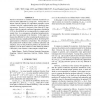Free Online Productivity Tools
i2Speak
i2Symbol
i2OCR
iTex2Img
iWeb2Print
iWeb2Shot
i2Type
iPdf2Split
iPdf2Merge
i2Bopomofo
i2Arabic
i2Style
i2Image
i2PDF
iLatex2Rtf
Sci2ools
ICASSP
2008
IEEE
2008
IEEE
A new Particle Filtering algorithm with structurally optimal importance function
Bayesian estimation in nonlinear stochastic dynamical systems has been addressed for a long time. Among other solutions, Particle Filtering (PF) algorithms propagate in time a Monte Carlo (MC) approximation of the a posteriori filtering measure. However, a drawback of the classical PF algorithms is that the optimal conditional importance distribution (CID) is often difficult (or even impossible) to compute and to sample from. As a consequence, suboptimal sampling strategies have been proposed in the literature. In this paper we bypass this difficulty by rather considering the prediction sequential importance sampling (SIS) problem; the filtering MC approximation is obtained as a byproduct. The advantage of this prediction-PF method is that it combines optimality and simplicity, since for the prediction problem, the optimal CID happens to be the prior transition of the underlying Markov Chain (MC), from which it is often simple to sample from.
Classical Pf Algorithms | ICASSP 2008 | Optimal Conditional Importance | Posteriori filtering Measure | Signal Processing |
Related Content
| Added | 30 May 2010 |
| Updated | 30 May 2010 |
| Type | Conference |
| Year | 2008 |
| Where | ICASSP |
| Authors | Boujemaa Ait-El-Fquih, François Desbouvries |
Comments (0)

